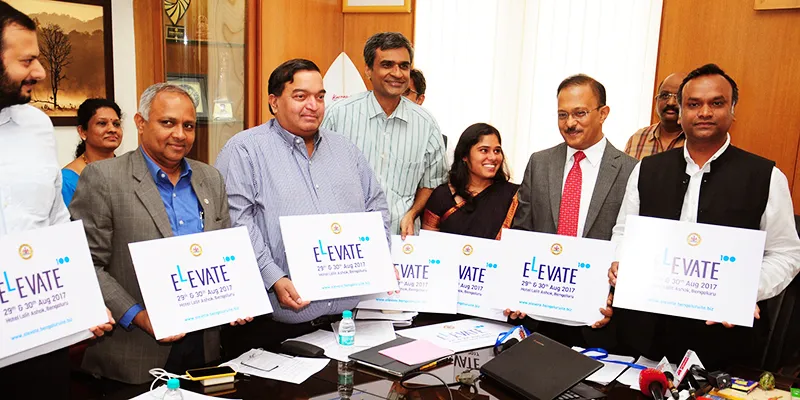Elevate: Technology leadership is relevant to Karnataka’s success in IoT sector
Gartner forecasts that 8.4 billion connected things will be in use worldwide in 2017, up 31 percent from 2016, and will reach 20.4 billion by 2020. Karnataka has hopped onto the IoT bandwagon and believes enterprises in the state can use technology by forging partnerships with startups.
A couple of years ago Ranjana Nair and her co-founders began noticing a data point that was startling - around nine million babies are born prematurely and several hospitals have no way of tracking the babies’ respiratory rates. Booting incubators in care units are expensive and are available only in large hospitals.

Ravi Gururaj, President, TiE Bengaluru, Naganand Doraiswamy, Managing Director & Founder, Ideaspring Capital, Sunil Kumar SK, CTO, Deshpande Foundation, Salma Fahim, MD, KBITS and Gaurav Gupta, Principal Secretary, IT & BT Department.
With infant mortality rate being high in India, which is 42 per 1000 kids born there was definitely a need for technology to play a role in baby monitoring. Identifying this need, Ranjana set up an IoT company called RayBaby, which would track respiration rates and predict a baby’s well-being to hospitals, care units, and parents.
“This gives power to the parents,” says Ranjana Nair, Co-founder of RayBaby at Elevate, the startup event organised by the government of Karnataka.
The power of data capture is what IoT delivers, but Indian industry is still reluctant to employ it. Uma Reddy, MD of Hitech Magnetics, supplier of components to transformers says that we are still not keen on IoT. “There is a fear of data sharing and security, SMEs will take time to get IoT implemented because it is an area that they don’t understand yet,” she says. Uma also adds that like GST, it needs a system to handhold companies to understand its benefits.
“Today we need every component to go through compliance processes because every MNC will track the components for compliance when ordered. It is completely digital today and we e sensors with massive compute capacities to support industrial and domestic consumption of information. IoT allows real time have made the first steps towards an IoT journey,” says Reddy.
IoT is indeed a big business opportunity for technology companies. “I believe it is a $12 billion dollar business in industrial IoT and this is a great opportunity for businesses,” says Radhika Shetty, founder of InciteCam.
IoT is the use of networks with very low latency and massive storage capabilities that enable predictive and prescriptive capabilities of services with smart devices as the medium of interface with things around us.
No wonder Karnataka has hopped onto the IoT bandwagon and believes enterprises in the state can use technology by forging partnerships with startups. Panelists who spoke about the use of AI were Rashi Menda of Zapyle and Vidhya T of Streamingo.
“Young people have a lot of ideas and technology talent is plenty in Karnataka,” Salma K Rahim, Director IT & BT and MD of KBITS. She says Elevate has curated 100 from 1600 startup applications received, out of which 300 applications were from women and the government wants to encourage more filings from women.
“Entrepreneurship is a long journey and people have to accept it as a way of life,” says Salma Rahim.
There is a way to connect
“In the early days networking was hard and things have changed now because the ecosystem is ready to fund and guide startups,” says Shanti Mohan, founder of LetsVenture. She adds that the government and the VC community are pushing startups and it is a good start towards creating an ecosystem. LetsVenture has helped more than 100 startups raise 45 million. The company has 14500 startups on the platform, of which 10 percent have been founded by women.
"The predictions for Karnataka receiving ideas in technology are very high," says Priyank Kharge, Minister for IT in Karnataka.
Chetan Anand, Director at PWC - Startup Advisory says that the top 100 startups are new ideas, with 30 percent of them in commercial operations. “We have looked at parameters such as social impact, business plan, team and the concept itself to select these companies. We believe these companies can leaders of the future,” he says.
India has had very few successes in the IoT sector. Most of them are small companies that have to compete with the likes of Siemens, Honeywell, and Bosch, which are large Indian subsidiaries of global MNCs. Today we have IoT companies like Smartron, Aibono, Peat and Kruzr changing Indian industry.
At least the Karnataka government believes programmes like Elevate will capture these companies and support them to become large enterprises.







